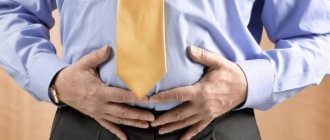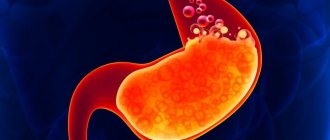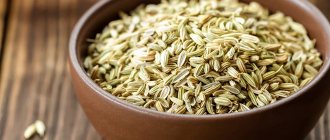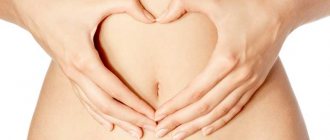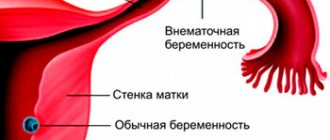Nervous pain
But can abdominal pain really be caused by nerves? It turns out it can.
Is it any wonder that “phantom” pain exists? A man's leg has been amputated at the knee for a long time, but he clearly feels pain in his little finger. Science knows the appearance of stigmata on the palms and feet of religious ascetics of the past, who sincerely empathized with the religious plot of the crucifixion. Therefore, functional abdominal pain is possible. The main thing is the ability to distinguish it in time from a catastrophe in the abdominal cavity, which requires urgent surgery.
Stomach neurosis - diet
First of all, you should review your diet, which should be regular - 5 times a day every 2-3 hours, and easily digestible. In this case, portions should not exceed a total weight of 150-200 grams. Changing your diet during periods of emotional stress is especially important. The patient should not overeat. Fried food should be replaced with boiled food. It is necessary to reduce the amount of fats and sugars that cause bloating, as well as avoid highly processed foods.
If you have a nervous stomach disorder, you need to eat right
The diet should be enriched with fiber, which is abundant in vegetables and fruits. The patient needs to drink at least two liters of water a day, replacing alcoholic and carbonated drinks with regular mineral water. People with stomach and intestinal problems, among others, should limit their intake of stimulants. Experts recommend completely giving up coffee and strong tea. Since the source of the problem lies in the nervous system and not the digestive system, diet will mainly affect the symptoms and not the cause. Therefore, it is worth it to alleviate the suffering of the patient. Take care of yourself and always be healthy!
Features of neurological abdominal pain
It is known that internal organs are innervated by the autonomic nervous system. It has significant differences from the somatic system: it does not obey our will, but works autonomously. And this system generates pain sensations that are not so bright and specific, but dull, diffuse and poorly localized.
Autonomic nervous system - diagram
For example, if you hurt your finger or foot, then you can show exactly where the pain is the worst. And if there is pain from the passage of a stone through the ureter, then, despite the clear position of the stone at each moment of time, the pain will be diffuse. Vague localization is what distinguishes autonomic pain.
What it is?
In simple terms, flatulence is the accumulation of gases in the intestines, which causes symptoms such as:
- bloating;
- pain in the abdominal area, which can radiate to the chest and sides;
- sudden profuse passage of gas.
Often the symptoms are complemented by:
- heartburn and belching;
- hiccups;
- feeling of heaviness in the stomach and throughout the abdomen, bloating;
- diarrhea.
Excessive gas accumulation in the intestines can bother any healthy adult from time to time, for example, after a heavy meal of cabbage or beans. The problem arises when flatulence becomes chronic.
The causes of chronic increased gas formation may be associated with diseases of the digestive system (pancreatitis, enteritis, etc.). However, with such diseases there is a vivid clinical picture of the disease, which is accompanied by flatulence.
In most cases, chronic bloating, which bothers a person day after day, month after month and year after year, and does not allow doctors to make any serious diagnosis, is nothing more than the body’s bodily reaction to mental discomfort .
Increased gas formation in the intestines, accompanied by bloating and pain, is a common physical manifestation of various neurotic conditions: the famous VSD (vegetative-vascular dystonia), generalized anxiety and panic disorder, OCD, neurotic depression, hypochondria, etc.
Causes of nerve pain in the abdomen
Abdominal pain “from nerves” primarily occurs from dysfunction of this very autonomic nervous system. After all, there can be no tunnel syndromes or pinched nerves in the abdominal cavity: there are no dense cartilage and bone formations, powerful ligaments in which long nerves can be compressed. On the contrary, everything in the abdominal cavity is perfectly “lubricated”, and the intestines are suspended on the mesenteries.
Perhaps the only exception in which the nerves of the abdominal cavity are infringed is hernia, but the mesentery is quite rarely infringed by the hernial orifice. The second situation is torsion of the mesentery with the occurrence of gangrene of the intestinal loop, intestinal obstruction and the development of peritonitis.
But in this situation, the immediate cause was mesenteric torsion with impaired circulation, and the corresponding neurological disorders were a secondary consequence of acute ischemia and should not be considered.
VSD
The most common cause of abdominal pain from nerves is vegetative-vascular dystonia. An imbalance between the sympathetic (stressful) and parasympathetic (trophic) parts of the autonomic nervous system leads to various conditions. For example, to hyperhidrosis, increased blood pressure, lethargy, feeling hot.
Sympathetic and parasympathetic divisions of the autonomic nervous system
One of these abdominal (abdominal) manifestations of vegetative-vascular dystonia is irritable bowel syndrome, which is manifested by an attack of diarrhea. In this case, it is possible that abdominal pain of a functional or nervous nature may appear.
It is known that every fifth person suffers from such a disorder in their life; in cities this figure is significantly higher. The reason, in addition to autonomic disorders, lies in the acceleration of the passage of food through the intestines, as well as a functional disorder of the nervous regulation of peristalsis, which is reversible.
What to do if your stomach hurts due to stress?
When your stomach hurts due to stress, self-medication can be dangerous. You should not start taking any medications: the symptoms of neurogenic gastralgia are similar to the symptoms of many acute diseases of the gastrointestinal tract and hepatobiliary system. If acute pain in the epigastric region, vomiting, or fainting occurs, you should call an ambulance, even if the attack is clearly associated with emotional stress.
The treatment regimen for neurogenic gastralgia always includes a whole range of measures. In addition to prescribing drugs that relieve the identified problem in the gastrointestinal tract (antacids and coatings), doctors recommend the selection and use of sedative medications, antidepressants, etc. To reduce the symptoms of attacks, antispasmodics (No-spa and its analogues) will be useful.
In addition to drug therapy, you will need the help of a psychologist who recommends techniques that increase stress resistance. These may include recommendations for changing jobs, physical education and relaxation exercises, a relaxing massage, etc.
Dear readers! We strongly recommend that you consult a doctor before taking medications or self-medicating. There are contraindications.
Place for ads
Symptoms of “irritable bowel”
Most often, this condition causes pain and discomfort, which are mildly expressed and more reminiscent of unpleasant sensations than actual pain. These sensations can be anywhere where the small intestine exists: for example, nervous pain in the lower abdomen, or in the navel area. In addition to unpleasant sensations, there are:
- bowel dysfunction, most experience diarrhea, but in some it alternates with constipation and impaired gas discharge;
- there is an imperative urge to defecate. This means that the desire to empty the bowels is so strong that “there is no limit to the torment.” As a rule, there is no logical explanation for this: there is no delay in bowel movements for many days before this;
- these pains and the desire to go to the toilet often occur during or immediately after eating. This occurs most often after breakfast.
This occurs due to the emergence of conditioned reflex connections between the upper gastrointestinal tract and the large intestine. Overstretching of the “full stomach” receptors is mistaken for a full intestine.
Fortunately, this process does not last long. Similar errors in the nervous system occur, for example, during recovery from pneumonia or severe infectious diseases. At this time, the body is still weakened. The nervous system is also weakened. This condition is called asthenovegetative syndrome. Soon after the body gets stronger, these unpleasant symptoms first weaken and then stop. Therefore, if you are suffering from such pain, you need to pay special attention to a diet that should not include rough food, and consult a doctor.
Causes of discomfort
If discomfort occurs, you should visit a doctor. The doctor will tell you whether the stomach ache may be caused by nerves and will determine the root cause of the deviation. The approach to treatment directly depends on the provoking factor.
Provoking factors of a psychological type include:
- stressful situations;
- overwork;
- psycho-emotional exhaustion;
- suffering psychological trauma;
- demanding attitude towards oneself.
Overwork may also be the cause of some diseases.
Stress weakens the immune system. In addition to stomach pain, the patient is at high risk of developing infectious diseases. A description of the main provoking factors is presented in the table.
| Provoking factor | Description |
| Social anxiety | A predisposing factor manifests itself when there is excitement before attending an event where there are no familiar people. A person worries that society will not like him. |
| Stressful situation and fear | The predisposing factor includes the most banal experiences. These include, for example, anxiety before entering a university or conflict situations. |
| Overexcitement | The factor can be either positive or negative. It occurs when a person worries for a long period of time before some upcoming event. |
In childhood, nervous pain syndrome in the stomach occurs against the background of bullying from peers. Pressure from teachers or parents also has a negative impact.
Stress from bullying at school can also cause pain.
Any experience provokes irritation of the gastric mucosa. Over time, the condition can become chronic.
Nervous type gastritis
Stress causes stomach pain due to frequent worries and emotional outbursts. It is important to be able to distinguish the nervous type of gastritis from the usual one. They have different approaches to treatment. Doctors say that gastrointestinal disease, resulting from mental stress, is present in 80% of people.
Nervous gastritis is a pathology that was formed due to frequent experiences and stress. Deviation in the absence of therapeutic therapy can provoke the appearance of ulcers or malignant neoplasms. It mainly affects residents of large cities.
Nervous gastritis occurs against the background of strong emotional experiences
Symptoms of gastritis caused by frequent stress include:
- frequent gag reflex;
- feeling of a lump in the throat;
- fainting;
- heart rhythm disturbance;
- sharp pain in the stomach, manifesting itself immediately after psycho-emotional overstimulation.
If you experience unpleasant symptoms, contact a gastroenterologist. If left untreated, the patient's condition worsens.
At first, when patients are nervous, their stomach hurts for a short time. At an advanced stage of the disease, discomfort is present for a long time and is characterized by severity.
Bad habits negatively affect the patient’s condition
The following can worsen the condition of nervous gastritis:
- bad habits;
- improper diet;
- long-term use of antibacterial tablets and other potent drugs;
- poisoning of the body.
The patient may complain of spontaneous attacks of suffocation. Tachycardia appears. To eliminate the disease, there is a need to follow a diet, take medications and consult with a psychotherapist. Therapy should be started as early as possible.
Sometimes there are attacks of suffocation
Stomach ulcer
Many patients get nervous and have a stomach ache. This symptom is very common and indicates many diseases and abnormalities in the functioning of the gastrointestinal tract.
Peptic ulcer disease is characterized by damage that forms when tissue is corroded by gastric juice. This is due to an increase in the amount of a certain enzyme. Acidity increases rapidly. The digestive organ begins to process itself.
People who are susceptible to developing peptic ulcers due to stress are:
- prone to self-oppression;
- worried about any, even minor, reason;
- characterized by imbalance.
Anger and irritability can also be symptoms of gastrointestinal disease
Stomach pain due to nervousness due to rapid processing of food products. Acceleration of the digestive process is caused by attacks of aggression and anger. Peptic ulcer disease often affects people who are accustomed to taking on everything themselves. They are usually overly responsible. This category of patients always feels the need for:
- coffee;
- smoking;
- alcohol.
The listed factors further aggravate the situation, but the patient gives preference to them to stimulate his activity. Doing this is strictly prohibited.
Nervous ulcers often occur in people who are accustomed to keeping all their emotions to themselves
With a peptic ulcer of the nervous type, the pain syndrome can have different localization. The patient complains of the following symptoms:
- excessive sweating;
- attacks of anxiety and fear;
- prostration;
- frequent mood changes;
- pain in the stomach, which has no distinct localization.
Standard medications are ineffective in treatment. The condition can be improved with the help of sedatives.
Anyone can experience attacks of anxiety and fear.
Gastric neurosis
Often, after stress, the stomach hurts due to gastric neurosis. The disease manifests itself due to anxiety, mental stress and exhaustion of the autonomic system. Accompanied by one or more of the following symptoms:
- pain in the stomach;
- bitterness in the mouth;
- causeless gag reflex;
- flatulence;
- rumbling;
- Excessive gas production.
The sick person may complain of a feeling of emptiness in the digestive organ. The symptom can appear even after eating. It is also possible that the exact opposite symptom may occur. The patient feels full even after one sip of water.
The presence of nausea indicates that the patient has serious problems
Often, patients who have stomach pain from nerves ignore signs that their condition is worsening. They attribute the present symptoms to minor intoxication. Gradually the condition becomes worse. Patients resort to self-medication and use drugs that are ineffective in a particular case.
Stomach neurosis is not a fatal disease. However, it significantly worsens the patient’s usual lifestyle. Stomach discomfort occurs regularly. The symptoms of the pathology are similar to other diseases of the gastrointestinal tract. It is impossible to recognize it on your own.
Diagnosis of neurosis is carried out by exclusion. The prescribed treatment by a gastroenterologist is adjusted by a neurologist and psychotherapist.
What is the danger of pain in osteochondrosis?
Each internal organ, be it kidneys or intestines, is connected via nerve endings to the spinal cord and brain. With osteochondrosis, the nerve endings are pinched. The first thing a person feels is pain. If he does not begin treatment, gradually the nerve endings burn out and do not perform their functions.
As a result, the functioning of internal organs is disrupted. The metabolic system in the body suffers. Vitamins and nutrients cease to be absorbed. Some of the pathologies become irreversible. For example, those that occurred due to pinched nerves in the thoracic region. In this case, the pancreas and liver cease to function fully.
How to naturally relieve pain from osteochondrosis
When the pain radiates to the lower abdomen, a natural way to relieve it is to stay in bed. In uncomplicated cases, in order for the unpleasant sensations to stop disturbing, it is enough to observe bed rest for 3 to 5 days. It would be a good idea to use ointments with an analgesic effect.
It is better not to take medications without the knowledge and approval of the doctor.
A qualified doctor knows that simply relieving pain is not enough. It is necessary to carry out a number of therapeutic measures aimed at restoring the full functioning of the spine, lumbar and thoracic region.
